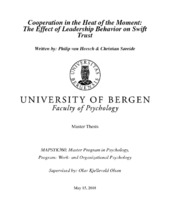Cooperation in the Heat of the Moment: The Effect of Leadership Behavior on SwiftTrust
Master thesis
Permanent lenke
https://hdl.handle.net/1956/17821Utgivelsesdato
2018-06-13Metadata
Vis full innførselSamlinger
Sammendrag
Development of trust demands personal knowledge and is time consuming; at least so scholars have argued for several decades. Very little work has been done to investigate why in some cases people act as if there are high levels of trust with strangers. While there has been some studies related to the rapid formation of trust, the time perspective differs widely between studies. This is the first study to approach this paradox with an experimental research design; Looking at leadership behavior as a predictor of trust. We were able to identify a trusting intention within the initial sixty seconds of the first meeting between strangers. We propose this form of trust is based of schematic evaluations, and can be operationalized as Immediate Trust. Tillit krever personlig kjennskap, og tar tid å bygge; dette har i hvert fall vært den ledende antakelsen i tillitslitteraturen. Veldig lite forskning har undersøkt hvorfor mennesker som er ukjente for hverandre allikevel kan samarbeide som om de skulle hatt høyt tillitsnivå mellom hverandre. Selv om noen studier har sett på tillit kan vokse frem hurtig, har tidsperspektivet i disse studiene vært svært varierende. Dette er det første studiet som har sett på tillit med en eksperimentell tilnærming. Ved å se på ledelsesatferd og emosjonell stabilitet som prediktorer for tillit kunne vi identifisere en tillitsintensjon innen de første seksti sekundene av det første møtet mellom to ukjente. Vi mener en slik form for tillit er basert på kognitive skjemaevalueringer og kan operasjonaliseres som umiddelbar tillit.
